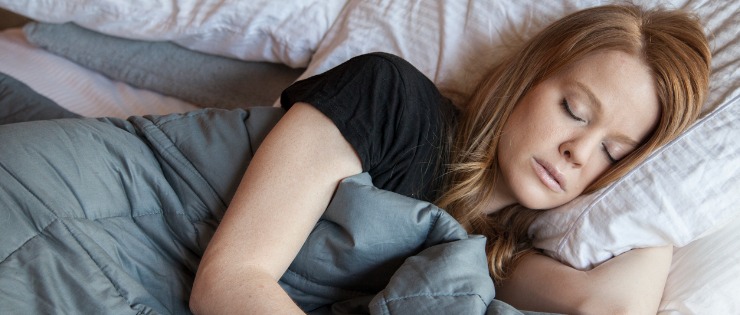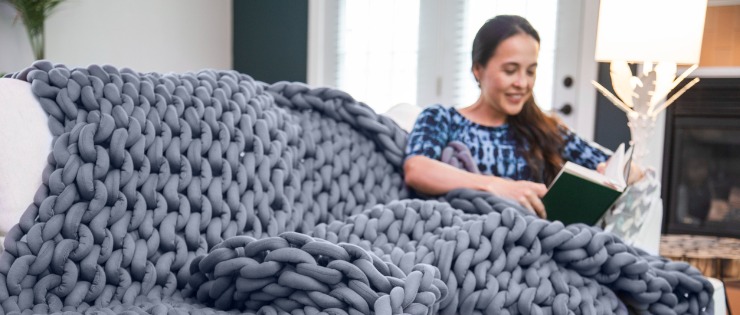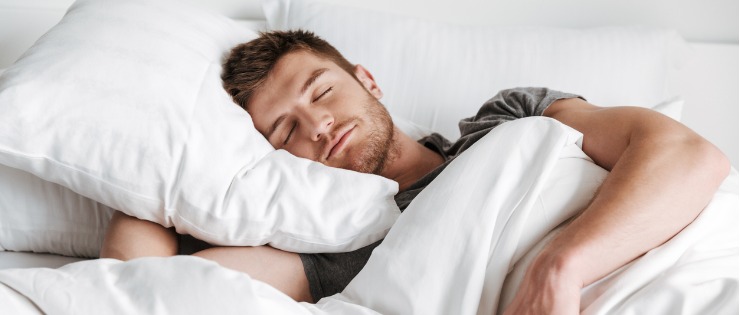
There has been a lot of hype about weighted blankets in recent years. Some converts won’t go to bed without one, while others have questioned if they’re just a gimmick. Since the worldwide introduction of weighted blankets in the late 1990s, some research has been conducted into their effectiveness and the benefits of deep pressure stimulation that weighted blankets provide.
What is a Weighted Blanket?
A weighted blanket is made extra heavy (in comparison to a standard blanket) with pellets or glass beads inside, or knitted with extra dense yarn.
These blankets are available in different weights between 2.2kg - 9kg. You can also choose a blanket based on bedding size - single, double, queen and king. Weighted blankets are designed to sit flat on the bed so there is an even distribution of weight rather than tucked into the bed base like you do with regular sheets and blankets. If two people in the bed want to use a weighted blanket, it’s recommended that they each have their own blanket.
If you’re shopping for a weighted blanket, you should look for one that is roughly 5-15% of your body weight. If the blanket is too heavy, it can place too much pressure on joints, cause discomfort and raise body temperature. A higher quality, more expensive blanket may offer more breathability than cheaper options.

What Does A Weighted Blanket Do?
Weighted blankets use deep pressure stimulation (DPS) to relax the nervous system. Deep pressure stimulation increases the amount of dopamine and serotonin in the brain. Known as the feel good chemicals, dopamine and serotonin help us feel calm and happy. The light pressure on the body stimulates a release of oxytocin.
A weighted blanket helps relax the nervous system and can assist with:
Improving your quality of sleep.
Reducing symptoms of anxiety and depression.
Reducing stress.
Helping to relieve chronic pain.
Assisting with attention and concentration.
Who Can Benefit From a Weighted Blanket?
Weighted blankets were originally designed to ease the anxiety of children on the autism spectrum, but since then, weighted blankets have been found to help relieve multiple conditions. While it’s still early days and not a lot of research has been conducted into the effectiveness of weighted blankets, there’s some evidence to suggest that the blankets can help with sleep problems and a range of other health conditions in children and adults.

Weighted Blankets Help With Poor Sleep
We swaddle newborns in wraps so they feel secure and to help them sleep. The weighted blanket is the equivalent for older children and adults who want to feel grounded with a heavy blanket, acting as a warm hug to help with nodding off.
Sleep experts still recommend sleep-inducing activities like shutting off electronic devices and screens before bed, dimming the lights, reducing caffeine intake, and keeping the bedroom cool and dark, but a weighted blanket is worth a try if nothing else works. People who struggle to fall asleep or stay asleep are often willing to try anything for relief. A lack of shut eye can make someone tired, irritable and unproductive the following day. A better night’s sleep can make all the difference to a person’s quality of life.
How Weighted Blankets Help With Sleep
Deep pressure stimulation is thought to increase the production of serotonin (the mood-boosting hormone) and reduce cortisol (the stress hormone). Both hormones are conducive to sleep, so if levels can be improved, better quality sleep is more likely to ensue. A weighted blanket may also encourage the release of oxytocin which can relieve pain and stress, making it a little easier for pain sufferers to fall asleep.
A sleep study in the US found that participants who used a weighted blanket for four weeks reported reduced insomnia severity, better sleep maintenance, reduced symptoms of fatigue, depression and anxiety. They were 26 times more likely to experience a 50% decrease in their insomnia severity compared to the control group. However, there is the possibility of the placebo effect, where participants believe their insomnia symptoms are reduced when using a weighted blanket in a study.
People with insomnia often have other health concerns that may be improved with a weighted blanket. A person with insomnia is 10 times more likely to suffer from depression than someone without insomnia.

Weighted Blankets Helping Health Conditions
As mentioned, weighted blankets were originally designed for children with autism. This came after the success of weighted vest trials. Over the years, people with other health conditions have found the blankets have provided some relief for them and research has followed.
Autism
Some people on the autism spectrum have found weighted blankets to be calming and comforting when they’re stressed or restless. Children with autism usually have impared sleep patterns between 18 and 42 months. While only limited research has been conducted into using weighted blankets as an intervention strategy to improve sleep in children with autism, the findings of one study showed limited success and that clinicians have more effective methods for improving sleep quality in children with autism.
Anxiety and Depression
People who suffer from mental health problems such as anxiety, depression, bipolar disorder and ADHD often struggle with poor sleep. It can be a vicious cycle of poor mental health causing a lack of sleep making their mental health symptoms worse.
Deep pressure stimulation helps reduce autonomic arousal which is responsible for causing some of the symptoms of anxiety, such as an increased heart rate. A review of eight studies in 2018 found that weighted blankets may be an appropriate therapeutic tool in reducing anxiety. However, evidence-based research on their effectiveness is sparse.

Attention Deficit Hyperactivity Disorder (ADHD)
Children with ADHD can use weighted objects to help with attention, reduced hyperactive movements, fidgeting and focus. Occupational therapists recommend weighted blankets because deep touch pressure releases serotonin in the body while providing proprioceptive input to the brain, which has a calming and organising effect on the central nervous system. The lack of serotonin is thought to be a key factor in people with autism, bi-polar, anxiety and post traumatic stress disorder.
In two separate studies, occupational therapists found an improvement in the classroom from increased attention spans and being able to stay on task when children used a weighted product such as a vest, a weighted stuffed toy on their lap or a blanket across their shoulders or legs. One study found a weighted vest improved classroom focus by 15-18%.
Pain Sufferers
People who live with chronic pain are also willing to try a wide range of potential cures to find relief. A weighted blanket has been found to provide relief for some pain sufferers, particularly if they have anxiety as well. A 2021 study in the US found weighted blankets reduced the perceptions of chronic pain in the group of participants who used a weighted blanket compared to those who used a light blanket.
Surgery Patients
Most people will experience some level of anxiety before an anaesthetic for surgery. A study was conducted in 2016 to analyse whether a weighted blanket can reduce some of the anxiety for patients undergoing wisdom tooth extraction. The study found that weight blankets had some calming effects and reduced symptoms of anxiety such as increased heart rate.
Who Shouldn’t Use a Weighted Blanket?
All blankets are a risk to babies under the age of 12 months because they can cause suffocation. Weighted blankets should not be used by any child under the age of two due to the risk of suffocation. There is also a choking hazard in under three year olds if the weight beads can escape from the blanket. A heavy yarn blanket would be the safest option for young children.
Asthma sufferers can risk breathing difficulties during sleep if they use a weighted blanket. Someone with obstructive sleep apnea may also experience issues with breathing while using a weighted blanket. People with circulatory issues, low blood pressure, type 2 diabetes and claustrophobia have also been recommended not to use weighted blankets.
Not everyone who tries a weighted blanket is a fan. Some people find them too constricting and not conducive to a good night’s sleep. Everyone has their own personal preferences when it comes to sleep. Sometimes you need to experiment with different aspects of your environment to find what works best for you.
If you aren't sure whether or not a weighted blanket will cater to your needs, speak with a healthcare professional to see if this will be an effective solution. If a weighted blanket doesn't help with getting a better night's sleep, it might be time to see a sleep specialist, which is covered by certain policies with a referral from your doctor.